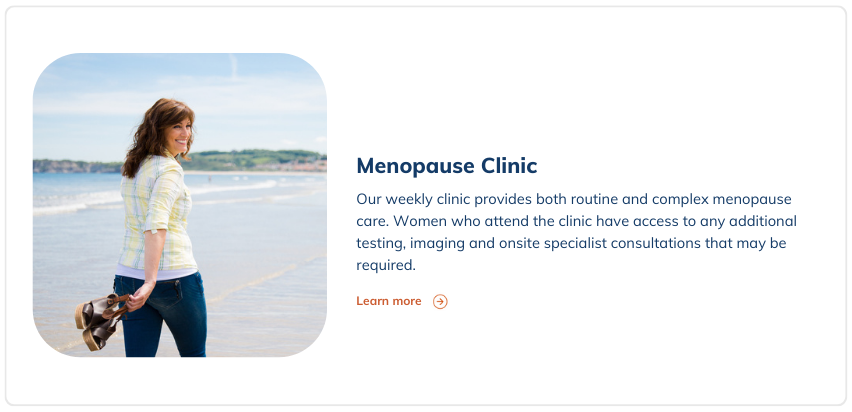Menopause
What is menopause?
Menopause is the natural process women go through as the female hormones (oestrogen & progesterone) begin to decrease, typically between the ages of 45-55. Menopause marks the end of the fertile period in a woman’s life.
There are a number of distinct phases that woman go through during menopause.

Perimenopause
Perimenopause is the first phase during which hormone levels begin to change. It usually starts a few years before your period stops. Each woman’s perimenopause is different, from the symptoms experienced to the length it lasts.
Menopause
To be confirmed as postmenopausal, 12 months must have passed since the last menstrual period (without any alternative cause for this such as hormonal contraception). FSH (follicle stimulating hormone) levels in the blood may also be assessed to support the diagnosis. During this phase, hormone levels continue to fall, so new symptoms may appear.
Early menopause
This is defined as menopause before the age of 45.
Premature menopause
Also called Premature Ovarian Insufficiency (POI), this is menopause before the age of 40. Treatment is usually recommended to prevent more serious long-term consequences such as osteoporosis and cardiovascular problems.

How do I know that I am in menopause?
There are so many different symptoms involved with the menopause that often it can become difficult for women to determine whether what they are feeling is a menopause symptom or another issue. The strongest indicators of menopause are age, change in cycle and hot flushes or night sweats.
Age
The average age for entering menopause is 51, but many women start noticing some symptoms such as disturbances to their previously regular menstrual cycle in their mid to late 40s, and others don’t notice anything until later in their 50s. Occasionally symptoms start in the early 40s, but this is unusual, and it is worth considering other explanations for symptoms.
Change in cycle
As women enter the first phase of menopause - perimenopause, they may start to notice changes in their menstrual cycle. The cycle becomes irregular and the duration of time between periods may shorten or lengthen. Sometimes a woman may go for a few months without a period, only for it to return suddenly.
Changes to the cycle from the age of 45 are likely to be linked to menopause. For women younger than this, there may be other reasons such as thyroid imbalance, nutritional deficiencies, or stress.
Hot flushes or night sweats
A hot flush, usually accompanied by sweating, is the most common symptom encountered. It is experienced by up to 80% of women going through menopause. Their emergence around the late 40s or early 50s can signify the start of perimenopause, especially if accompanied by changes in the menstrual cycle. They happen as changes in hormone levels upset the temperature regulating part of the brain.
There are other reasons for flushes and sweats that are important to consider. Always check with a doctor to rule out any of these conditions.
What are the other symptoms?
Intimate body changes
Lower oestrogen levels, together with a decrease in testosterone, can lead to a reduction in libido or sexual drive. Vaginal dryness can contribute to this, which occurs because of a reduction in oestrogen. This may cause a thinning of the tissues of the vagina and decreased secretions resulting in less lubrication.
Weight Gain
The decreased levels of oestrogen associated with menopause may lead to a decline in muscle mass. This reduction in muscle mass slows the rate at which your body burns calories (metabolism). The reduction in metabolism means that more fat is stored. In addition to this, fat is more likely to be stored around the abdomen than other areas of the body.
Low mood, irritability, and anxiety
Decreasing levels of hormones can affect the way the brain functions and women may experience mood swings or low mood. Anxiety and irritability can also be part of menopause. Some women find that their pre-menstrual syndrome (PMS) symptoms worsen during the perimenopausal period. Occasionally, anxiety or irritability may be accompanied by palpitations, or an awareness of one’s heartbeat.
Weakening of connective tissues
Hormonal changes during menopause cause the connective tissue under the skin to become thinner and less elastic. This affects the strength and condition of hair, skin and nails. These same changes can also affect the tissues controlling the bladder, increasing the need to pass urine more frequently or causing Stress Urinary Incontinence. In the same way, the tissues surrounding the vagina become weaker, sometimes leading to Vaginal Prolapse.
What are the treatment options?
HRT
HRT is the commonly used abbreviation for Hormone Replacement Therapy. HRT replaces the female hormones no longer produced after menopause and involves taking small doses of these hormones; oestrogen and/or progesterone.
HRT can be taken in many forms: tablet; patch; gel; spray; intrauterine coil; cream or vaginally. It is important to find the correct type for your individual situation.
Common forms include:
Cyclical HRT
This is the type of HRT that imitates the natural menstrual cycle by causing regular menstrual bleeding every month, like a light period. It is used in women who are perimenopausal and have ongoing or recent menstrual periods. Both oestrogen and progesterone are taken at different stages throughout the month. The hormones trigger a reaction which causes the lining of the uterus to build up and then shed.
Oestrogen-only HRT
This is normally prescribed to women who have had a hysterectomy. Most types of HRT involve the use of both oestrogen and progesterone, where the benefit of the therapy is from the intake of oestrogen. Progesterone is only taken to protect the lining of the womb. In most cases, if the woman has had a hysterectomy, where the womb is removed, there is no need to take progesterone. Oestrogen-only HRT can only be taken if all of the uterine tissue has been removed.
Continuous Combined Therapy (CCT)
Most women start by using Cyclical HRT and then move onto Continuous Combined Therapy (CCT) once they are postmenopausal. It can be started in the first instance in women who are postmenopausal (have not had a period for 12 months). Both oestrogen and progesterone are taken every day, balanced so that monthly bleeding does not occur.
Local oestrogen such as vaginal tablets, pessaries or creams
This type of HRT comes in the form of creams, vaginal tablets, or vaginal pessaries. Oestrogen is absorbed vaginally to treat vaginal or urinary symptoms such as dryness or irritation. The use of local oestrogen minimises the absorption of oestrogen into the rest of the body and its attendant side effects. Progesterone is not required with this as systemic absorption is minimal.
Tibolone
Tibolone is a synthetic compound. It is taken in tablet form and mimics the effects of oestrogen, progesterone, and androgens, which are male hormones.
Maintaining a healthy lifestyle
For women who start the menopause after the age of 45, or women who are not affected by the symptoms of the menopause, HRT is not necessary. However, whether taking HRT or not, it is important to stay healthy.
Women are advised to maintain a healthy lifestyle through regular exercise, eat a balanced diet rich in fresh fruit and vegetables with a limited alcohol intake and no smoking. Other strategies may be implemented to reduce the risk of for example, osteoporosis and heart disease.
Managing stress is vital for staying healthy. Managing stress can also help relieve the symptoms of the menopause. Techniques such as yoga, acupuncture and meditation are beneficial in the management of stress.
The Centre for Women’s Health in the Mater Private Hospital Cork has recently opened a new menopause clinic. It is the only clinic in Ireland that has consultants experienced in women’s health issues, such as general & urogynaecology under one roof. Dr Alex O’Brien, specialist GP, is on hand to help with any menopause related issues you may be experiencing. Visit our Menopause Clinic page to book a consultation.
This content has been reviewed by Dr. Alex O’Brien, General Practitioner in Women’s Health at our Centre for Women's Health in Cork.









